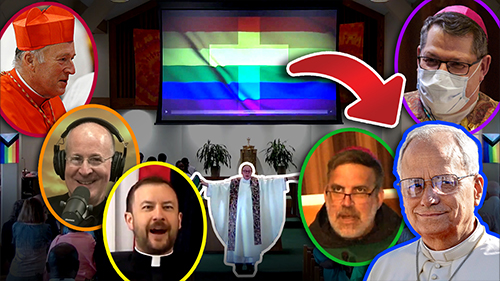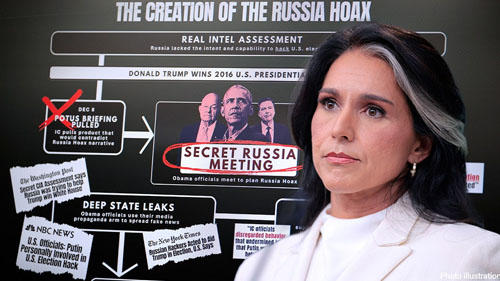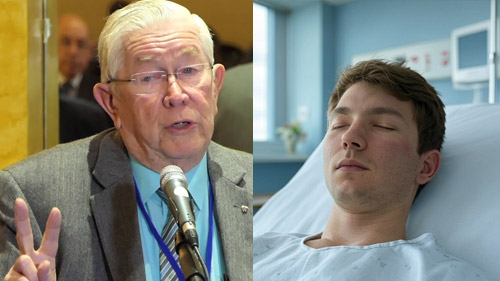| Recent Featured Videos and Articles | Eastern “Orthodoxy” Refuted | How To Avoid Sin | The Antichrist Identified! | What Fake Christians Get Wrong About Ephesians | Why So Many Can't Believe | “Magicians” Prove A Spiritual World Exists | Amazing Evidence For God | News Links |
| Vatican II “Catholic” Church Exposed | Steps To Convert | Outside The Church There Is No Salvation | E-Exchanges | The Holy Rosary | Padre Pio | Traditional Catholic Issues And Groups | Help Save Souls: Donate |  |









 " />
" /> " />
" /> " />
" /> " />
" /> " />
" />




Was Vatican II infallible?
Video: Was Vatican II Infallible?
Debate: Busting Myths about Vatican II’s “Infallibility”
We have exposed in detail the heresies of Vatican II. We have also shown that the men who implemented this non-Catholic Council were not true popes of the Catholic Church, but antipopes. Despite all of the evidence, some people remain unconvinced. They hold that there are indeed doctrinal problems with Vatican II; but, according to them, this is no problem for Paul VI because he did not infallibly promulgate any of the Vatican II heresies. “The heresies of Vatican II don’t matter,” they say, “because Vatican II was not infallible!” We will now show that if Paul VI had been a true pope, the documents of Vatican II would have been promulgated infallibly. This will prove, again, that Paul VI (the heretic who promulgated the apostate documents of Vatican II, changed the rites to all seven sacraments, changed the Mass into a Protestant service, oversaw the systematic and world-wide dismantling of Catholicism, ruined the world-wide Catholic school system, and initiated the greatest apostasy from Catholicism in history) was not and could not have been a true pope. He was an antipope.
There are three conditions that need to be met for a pope to teach infallibly: [1] the pope must carry out his duty as pastor and teacher of all Christians; [2] he must teach in accord with his supreme apostolic authority; and [3] he must explain a doctrine of faith or morals to be believed by the universal Church. If a pope fulfills these conditions, he, through the divine assistance promised him as successor of Peter, operates infallibly, as the following definition of Vatican Council I teaches.
We will now prove, point by point, that Paul VI’s promulgation of the documents of Vatican II fulfilled all three of these requirements, which would make the documents of Vatican II infallible if he had been a true pope.
1) A Pope must act as Pastor and teacher of all Christians
The first requirement for a pope to teach infallibly is that he must act as pastor and teacher of all Christians. If he was the true pope, Paul VI fulfilled this requirement.
EACH ONE OF THE 16 DOCUMENTS OF VATICAN II BEGINS WITH THESE WORDS:
Pope Eugene IV began the 9th session of the dogmatic Council of Florence with these words: “Eugene, bishop, servant of the servants of God, for an everlasting record.”[4] Pope Julius II began the 3rd session of the dogmatic 5th Lateran Council with these words: “Julius, bishop, servant of the servants of God, with the approval of the sacred council, for an everlasting record.”[5] And Pope Pius IX began the 1st session of the dogmatic First Vatican Council with these words: “Pius, bishop, servant of the servants of God, with the approval of the sacred council, for an everlasting record.”[6] This is the customary way in which the decrees of general/dogmatic/ecumenical councils are solemnly begun by popes. Paul VI began every document of Vatican II in the very same way, with the very same words!
By beginning each document of Vatican II in this way, Paul VI (if he was a true pope) clearly fulfilled the first requirement to teach infallibly.
2) A Pope must teach in accord with his supreme apostolic authority
The second requirement for a pope to teach infallibly is that he must teach in accord with his supreme apostolic authority. If he was the pope, Paul VI fulfilled this requirement.
EACH ONE OF THE 16 DOCUMENTS OF VATICAN II ENDS WITH THESE WORDS (OR WORDS BASICALLY IDENTICAL TO THESE):
Wow! This little known fact is utterly devastating to any claim that Paul VI could have been a true pope. Paul VI ended each Vatican II document by invoking his “apostolic authority,” followed by his signature! He clearly fulfilled the second requirement for infallibility. In fact, this paragraph in itself fulfills not just the second requirement for Papal Infallibility, but all three; for in it we see Paul VI is “approving, decreeing and establishing” in “the holy Spirit” and “by his apostolic authority” all the things contained in each document! This is infallible language. Anyone who would deny this simply doesn’t know what he is talking about.
The approval given to Vatican II by Paul VI (quoted above) is even more solemn than the approval given to the infallible Council of Nicaea (325) by Pope St. Sylvester. It’s more solemn than the approval given to the infallible Council of Ephesus (431) by Pope St. Celestine. In other words, in approving the true councils of the Catholic Church, these true popes approved the documents of these councils in ways that were even less extraordinary than the way in which Paul VI approved Vatican II; and yet their approval of these true councils was sufficient to qualify as infallible and binding – a fact which no Catholic questions.
It is, therefore, a fact that each Vatican II document is a solemn act of Paul VI. Each document is signed by him; each one is begun with him speaking as “pastor and teacher of all Christians”; and each one finished with him “approving, decreeing and establishing” all of the document’s contents in virtue of his “apostolic authority.”
This proves that if Paul VI was the pope the documents of Vatican II are infallible! But the documents of Vatican II are not infallible; they are evil and heretical. Consequently, this DESTROYS ANY POSSIBILITY that Paul VI was ever a true pope; for a true pope could never promulgate the evil documents of Vatican II in this authoritative manner.
3) A Pope must explain a doctrine of faith or morals to be held by the universal Church
We’ve already proven that Paul VI fulfilled all three requirements to teach infallibly at Vatican II if he were the pope. For the sake of completeness, however, we will finish the point-by-point proof by noting that the Vatican II documents are filled with teachings on faith and morals (part of the third requirement). And they must be held by the universal Church, if Paul VI was the pope, because Paul VI solemnly approved, decreed and established them, in virtue of his “apostolic authority,” ordering that they be published.
Therefore, the third requirement for infallibility was also fulfilled by Paul VI in his promulgation of Vatican II. But there’s still more!
In his brief declaring the council closed, Paul VI again invoked his “apostolic authority” and acknowledged that all the constitutions, decrees and declarations of Vatican II have been approved and promulgated by him. He further stated that all of it must be “religiously observed by all the faithful”! He further declared all efforts contrary to these declarations null and void.
Paul VI says Vatican II is to be Religiously Observed
There you have it. The apostate Second Vatican Council is to be “religiously observed,” if you accept Paul VI. There can be no doubt that if Paul VI was a true pope the gates of Hell prevailed against the Catholic Church on Dec. 8, 1965. If Paul VI was the pope, Jesus Christ’s promises to His Church failed. If Paul VI was the pope, all of Vatican II’s teaching on faith or morals was promulgated infallibly (ex cathedra). But this is impossible – and anyone who would say that it is possible doesn’t believe in Catholic teaching on the indefectibility of the Catholic Church. Thus we know that Giovanni Montini (Paul VI) was not a true successor of Peter, but an invalid antipope – which we already proved so clearly in exposing his incredible heresies which showed that his “election” – since he was a manifest heretic – was invalid.
And if you are not convinced of this, ask yourself this question: Is it possible for a true Catholic pope to “approve, decree and establish” all of the heresies of Vatican II “in the Holy Spirit” and by his “apostolic authority”? Your Catholic sense tells you the answer. No way. Therefore, those who recognize the heresies of Vatican II and the facts that we are presenting here, and yet still maintain that it was possible that Antipope Paul VI was a true pope, are unfortunately in heresy for denying Papal Infallibility and for holding a position which means that the gates of Hell have prevailed against the Catholic Church.
Some people will erroneously argue that for a pope to speak ex cathedra he must condemn the opposing view or set forth penalties for non-observance. This is not true. Nowhere in the definition of Pope Pius IX on papal infallibility does he say that the pope must condemn in order to operate infallibly. There are a number of infallible definitions where popes don’t condemn or set forth any penalties.
Objections- We will now refute the common objections made by those who argue that Vatican II wasn’t infallibly promulgated by Paul VI even if he was the pope.
Objection #1) At his speech to open Vatican II, John XXIII said that Vatican II was to be a “pastoral council.” This proves that Vatican II was not infallible!
Response: This is not true. John XXIII did not say in his opening speech at the council that Vatican II was to be a pastoral council. Here is what John XXIII actually said:
John XXIII, Opening Speech at Vatican II, Oct. 11, 1962: “The substance of the ancient deposit of faith is one thing, and the way in which it is presented is another. And it is the latter that must be taken into great consideration with patience if necessary, everything being measured in the forms and proportions OF A MAGISTERIUM WHICH IS PREDOMINANTLY PASTORAL IN CHARACTER.”[9]
Here we see that John XXIII did not say that Vatican II would be a pastoral council. He said that it would reflect the Church’s Magisterium, which is predominantly pastoral in character. So, despite the incredibly widespread myth, the truth is that John XXIII never even called Vatican II a pastoral council in his opening speech. By the way, even if John XXIII had called Vatican II a pastoral council in his opening speech, this wouldn’t mean that it is not infallible. To describe something as pastoral does not mean ipso facto (by that very fact) that it’s not infallible. This is proven by John XXIII himself in the above speech when he described the Magisterium as “pastoral,” and yet it’s de fide (of the faith) that the Magisterium is infallible. Therefore, even if John XXIII did describe Vatican II as a pastoral council (which he did not) this would not prove that it is not infallible.
Most importantly, however, the fact that John XXIII did not actually call Vatican II a pastoral council in his opening speech at Vatican II doesn’t actually matter. This is because, as we saw already, it was Paul VI who solemnly confirmed the heresies of Vatican II; and it is Paul VI’s confirmation (not John XXIII’s) which proves that Vatican II is binding upon those who accept him.
Objection #2) Paul VI said in his General Audience on Jan. 12, 1966, that Vatican II “had avoided proclaiming in an extraordinary manner dogmas affected by the mark of infallibility.”
Response: It is true that Paul VI stated in 1966 (after Vatican II had already been solemnly promulgated) that Vatican II “had avoided proclaiming in an extraordinary manner dogmas affected by the mark of infallibility.” However, Antipope Paul VI’s statement in 1966 is irrelevant. It does not and cannot change the fact that he solemnly promulgated (in a way that would be infallible if he were the pope) all of the documents of Vatican II on Dec. 8, 1965. Paul VI had already signed and sealed Vatican II long before Jan. 12, 1966. Vatican II was solemnly closed on Dec. 8, 1965. This means that if Paul VI was the pope (which he wasn’t), the gates of Hell prevailed against the Church on Dec. 8, 1965 because of his solemn and final promulgation of all the heretical Vatican II documents on that day.
The Magisterium is a teaching authority whose teachings are “irreformable” (de fide definita, Vatican I, Denz. 1839). Since they are irreformable, they are unalterable from the date on which they are declared. If Antipope Paul VI had been a true Pope, Vatican II was irreformable and infallible on Dec. 8, 1965. Nothing said or done after Dec. 8, 1965 could undo (if Paul VI were a true pope) that which was done already, for then the Magisterium’s teaching would become reformable. Hence, the speech of Antipope Paul VI in 1966 (after the council was closed) has no relevance to whether or not Vatican II was infallible.
But why, then, would Antipope Paul VI make such a statement? The answer is simple. The diabolical (satanic) intelligence guiding Antipope Paul VI knew that, eventually, everyone with a traditionally Catholic mindset would not accept these decrees of Vatican II as infallible, since they are filled with errors and heresies. Consequently, if he hadn’t made this statement in 1966 that Vatican II had avoided extraordinary definitions with infallibility, a vast body of people would have come to the immediate conclusion that he (Giovanni Montini - Antipope Paul VI) was not a real pope. So the Devil had quite a bit riding on this statement.
The Devil had to propagate among “traditionalists” the idea that Paul VI did not “infallibly” promulgate Vatican II. It was essential to the Devil’s entire post-Vatican II apostasy; he was scared to death that millions would have become sedevacantists denouncing Antipope Paul VI, his false Church and his false mass (the Novus Ordo). Hence, the Devil inspired Antipope Paul VI to say (well after Vatican II had been solemnly promulgated by him) that Vatican II didn’t issue dogmatic statements. This assurance, the Devil hoped, would give Paul VI the appearance of legitimacy among those who maintained some attachment to the traditional Faith. But this diabolical ploy collapses when one considers the fact that Vatican II had already been closed in 1965.
Furthermore, and perhaps most importantly, it must be pointed out that in the same Jan. 12, 1966 General Audience, Paul VI said:
If people are going to quote Paul VI’s Jan. 12, 1966 General Audience to attempt to prove that Vatican II wouldn’t have been infallible even if Paul VI was the pope, then logically they must accept other statements about Vatican II which Paul VI made in that General Audience, such as the one quoted above and the one quoted below. In this quotation above, we clearly see that Paul VI says (in the very same General Audience) that Vatican II is an act of the Magisterium and that anyone who adheres to Vatican II is “honoring the magisterium of the Church”! [The Magisterium is the infallible teaching authority of the Church.]
Therefore, Paul VI’s speech means that, according to him, Vatican II is infallible – since he says that it is the teaching of the Magisterium, which is infallible. His speech further says that anyone who accepts Vatican II’s teaching (i.e., its heresies) – such as that non-Catholics may receive Holy Communion or the heresies on religious liberty or that Muslims and Catholics worship the same God, etc. – is honoring Catholic teaching. Anyone who wants to “go by” this speech, therefore, must admit that those who accept these heresies honor Catholic teaching! This is clearly absurd and false; it proves that, no matter which way one wants to look at this issue in conjunction with this General Audience of Paul VI, Vatican II is binding upon all who hold that Paul VI was a valid pope – which proves that Paul VI definitely was not a true pope. You cannot quote this General Audience to say one is not bound to accept Vatican II, when the same General Audience says that anyone who follows it is honoring the Magisterium! Paul VI goes on to say in the same speech:
This part of the speech is almost never quoted by the defenders of Paul VI, probably because they know that the teaching of the Supreme Ordinary Magisterium is infallible, which means that even this General Audience of Antipope Paul VI affirms the infallibility of Vatican II. In the same General Audience, Paul VI also said this:
Furthermore, Paul VI stated in his encyclical Ecclesiam Suam (addressed to the entire Church) that Vatican II had the task of defining doctrine.
This means that Vatican II had the task of teaching infallibly. And in the next section we will quote from Paul VI’s 1976 speech where he addresses the very subject of whether Vatican II and the New Mass are binding and specifically rejects the claims of false traditionalists who want to be able to hang on to Paul VI’s legitimacy while rejecting his Mass and council.
Objection #3) Vatican II was not infallible because there was a note attached to the document Lumen Gentium that said it was not infallible.
Response: [Note: the response to this objection is in-depth and involved, and some might not find it interesting. If you are not looking for the answer to this objection, you might want to skip this one.]
Some defenders of Paul VI make reference to a theological note that was attached to the document Lumen Gentium. They think this clarification proves that Paul VI didn’t promulgate Vatican II infallibly or authoritatively. But this argument doesn’t hold up under scrutiny. Here is the crucial portion of the theological note that was attached to the document Lumen Gentium:
First, this note is not even part of the actual text of the document Lumen Gentium; it’s an appendix to the text of Lumen Gentium.[13]
Second, this note is attached only to Lumen Gentium, not the rest of the documents. In other words, even if this theological note did “save” Paul VI’s promulgation of the heresies in Lumen Gentium (which it didn’t), it still did not “save” his promulgation of the rest of the Vatican II heresies.
Third, if one reads the above note one can see that it declares that the subject matter, or the way something is said within Vatican II, identifies that Vatican II is enacting the supreme Magisterium of the Church, in accordance with the rules of theological interpretation – that is to say, as the Church in the past has enacted the supreme Magisterium. Paul VI’s declaration at the beginning and end of every Vatican II document (quoted already) definitely indicates, by “the way it is said,” “in accordance with the rules of theological interpretation” (that is, paralleling past dogmatic decrees), that he is enacting the supreme Magisterium (if he had been a pope). Therefore, this theological clarification attached to the document Lumen Gentium does not diminish or negate the solemn language of Paul VI found at the end of every Vatican II document. Rather, his language at the end of every Vatican II document fulfills the requirements of the theological note.
Fourth, those who attempt to use this note in order to “save” all of the documents of Vatican II from compromising Papal Infallibility don’t pay much attention to what it actually said. The note clearly stated that “the other matters which the synod (Vatican II) puts forward as the teaching of the supreme Magisterium of the Church, each and every member of the faithful should accept and embrace according to the mind of the synod itself, which is clear either from the subject matter or the way it is said, in accordance with the rules of theological interpretation.”
This is a very important point! There are numerous instances in Vatican II where Vatican II is setting forth what it believes to be the teaching of the supreme Magisterium, which “each and every member of the faithful should accept and embrace according to the mind of the synod itself, which is clear either from the subject matter or the way it is said…” For instance, in its heretical Declaration on Religious Liberty (Dignitatis Humanae), Vatican II says this:
Here Vatican II explicitly indicates that its heretical teaching on religious liberty is rooted in divine revelation and is to be held sacred by Christians. This clearly fulfills the requirements of the theological note for a teaching that “each and every member of the faithful should accept and embrace according to the mind of the (Vatican II) synod itself, which is clear either from the subject matter or the way it is said…” And there is more:
Here Vatican II explicitly indicates that its heretical teaching on religious liberty is: 1) faithful to the truth of the Gospel; 2) follows the way of Christ and the apostles; and 3) is in accord with the revelation of God! We remind the reader again of the wording of the theological note, which stated that “the other matters which the (Vatican II) synod puts forward as the teaching of the supreme Magisterium of the Church, each and every member of the faithful should accept and embrace according to the mind of the synod itself, which is clear either from the subject matter or the way it is said, in accordance with the rules of theological interpretation.”
Therefore, according to the theological note itself, those who accept Paul VI as a pope are bound to accept Vatican II’s heretical teaching on religious liberty as the teaching of the supreme Magisterium of the Church! The theological note binds them to accept Vatican II’s heretical teaching on religious liberty as: 1) faithful to the truth of the Gospel; 2) following the way of Christ and the apostles; and 3) in accord with the revelation of God because this is “the mind of the synod itself (Vatican II), which is clear from the subject matter or the way it is said…” It’s very simple: those who believe that Antipope Paul VI was the pope are bound to the heretical document on religious liberty.
To summarize all of the points made so far: 1) the theological note attached to Lumen Gentium does not apply to every document; 2) the theological note attached to Lumen Gentium does not diminish or negate the language of Paul VI at the end of every Vatican II document, but rather proves that his language at the end of every document fulfills the requirements for infallible teaching of the Magisterium; 3) even if the theological note did apply to every document – and somehow did make Paul VI’s solemn language at the end of each document non-binding (which it most certainly doesn’t) – the theological note itself still proves that various documents in Vatican II are infallible and binding by the way Vatican II presents its teaching on these matters. No matter which way one tries to escape the reality that Antipope Paul VI could not have been a true pope and at the same time promulgate Vatican II, he fails.
St. Peter vs. Anti-Peter
In his dogmatic encyclical Quanta Cura, Pope Pius IX infallibly condemned the heretical doctrine of religious liberty (which had also been condemned by numerous other popes). Pope Pius IX explicitly anathematized the heretical idea that religious liberty should be a civil right in every rightly constituted society. The Catholic Church teaches that a government which recognizes the right to religious liberty - like the U.S.A. – is, of course, preferable to one which suppresses Catholicism. Nevertheless, this situation is only the lesser of two evils. The ideal is a government which recognizes the Catholic religion as the only religion of the state and does not give every person the “freedom” to practice and propagate his/her false religion in the public domain. Therefore, the idea that religious liberty should be a universal civil right is heretical, as Pope Pius IX infallibly defined in Quanta Cura.
Pope Pius IX condemned, reprobated and proscribed (outlawed) by his apostolic authority the heretical idea that every state should grant the civil right to religious liberty. But watch this! Whereas Pope Pius IX condemned, reprobated and proscribed (outlawed) this doctrine by his apostolic authority, Antipope Paul VI approves, decrees and establishes this condemned teaching by his “apostolic authority.” In other words, that which Pope Pius IX solemnly condemns by his apostolic authority is exactly what Antipope Paul VI solemnly teaches by his “apostolic authority”!
The Authority of St. Peter vs. The Authority of Anti-Peter
Is it possible for Paul VI to possess the same “apostolic authority” as Pope Pius IX? Does the apostolic authority of St. Peter contradict itself? No way! It is heresy to say so! (Lk. 22:32; Vatican I, Sess. 4, Chap. 4.)
With these facts in mind, one can see why those who obstinately maintain that Paul VI was a true pope deny Papal Infallibility. They deny the indefectibility of the Church; they assert that the apostolic authority conferred by Christ upon the successor of Peter contradicts itself; and they assert that the gates of Hell have prevailed against the Catholic Church.
The truth is that Antipope Paul VI was never the validly elected pope of the Catholic Church; and therefore his solemn promulgation of the heresies of Vatican II did not infringe upon Papal Infallibility. As we saw already, the Catholic Church teaches that it’s impossible for a heretic to be elected pope, since a heretic is not a member of the Catholic Church. This was defined in Pope Paul IV's Apostolic Constitution Cum ex Apostolatus Officio.
*For more information on Vatican II’s primary heresies, consult our article: The Heresies in Vatican II located on our website.
[1] Walter M. Abbott, The Documents of Vatican II, The America Press, 1966, p. 366, etc.
[2] Denzinger, The Sources of Catholic Dogma, B. Herder Book. Co., Thirtieth Edition, 1957, no. 1839.
[3] Walter M. Abbott, The Documents of Vatican II, pp. 137, 199, etc.
[4] Decrees of the Ecumenical Councils, Sheed & Ward and Georgetown University Press, 1990, Vol. 1, p. 559.
[5] Decrees of the Ecumenical Councils, Vol. 1, p. 597.
[6] Decrees of the Ecumenical Councils, Vol. 2, p. 802.
[7] Walter M. Abbott, The Documents of Vatican II, p. 366, etc.
[8] Walter M. Abbott, The Documents of Vatican II, pp. 738-739.
[9] Walter M. Abbott, The Documents of Vatican II, p. 715.
[10] The Papal Encyclicals, by Claudia Carlen, Raleigh: The Pierian Press, 1990,Vol. 3 (1903-1939), p. 355.
[11] The Papal Encyclicals, Vol. 5, p. 140.
[12] Decrees of the Ecumenical Councils, Vol. 2, p. 898.
[13] Walter M. Abbott, The Documents of Vatican II, p. 97.
[14] Decrees of the Ecumenical Councils, Vol. 2, p. 1006.
[15] Decrees of the Ecumenical Councils, Vol. 2, pp. 1008-1009.
[16] Denzinger 1690, 1699.
[17] Walter M. Abbott, The Documents of Vatican II, pp. 675, 679, 696.
[18] Denzinger 1690, 1699.
[19] Walter M. Abbott, The Documents of Vatican II, pp. 675, 679, 696.
[20] The Papal Encyclicals, Vol. 2 (1878-1903), p. 394.
[21] Denzinger 1837.
Sign up for our free e-mail list to see future vaticancatholic.com videos and articles.
Recent Content
^